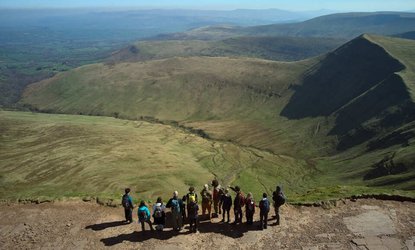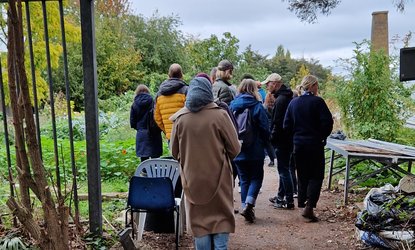As a signatory to the Funder Commitment on Climate Change, we recognise that the growing climate emergency is a serious risk to the pursuit of our charitable aims and have made six key commitments. Below, we share an update on our work towards their implementation during 2022.
- Educate and Learn
- We shared a series of blogs about our support and work with partners to improve our natural world. As well as giving an overview of our approach, they also cover each of our priority areas and ask what more we can do.
- Our roadmap for improving our natural world
- Working towards a more diverse, inclusive and equitable environment sector
- Financing nature’s recover – the £43bn question
- What we’re doing to protect and restore freshwater in the UK
- Supporting a widespread transition to nature friendly farming
- Healthy UK seas and thriving coastal communities
- Championing peat and restoring peatland at scale
- We have a system in place for capturing key learning from our work and those of others which we disseminate internally. We also regularly share our own learning as well as research and evaluation reports we’ve commissioned about work we support on our website and through our social media channels and monthly newsletter. In 2022, they include:
- We also regularly highlight the work of some of the organisations we support on our social media channels and newsletter. For example, in 2022, we shared responses and calls to action from environment groups on policy issues such as the Government’s Green Finance Strategy, proposed changes to nature and climate laws, and call to protect 30% of the land and sea by 2030. We also shared reports such as Confronting injustice: racism and the environmental emergency by Greenpeace and Runnymede Trust, and Building the future: a faster route to clean steel by Green Alliance.
- We circulate invitations we receive to external presentations and events to our staff and trustees. We do the same with key pieces of research on climate change. Reports from the likes of CarbonTracker, CDP and ShareAction have been influential.
- We have an annual budget for staff development for those who wish to attend more specific courses and hold lunches for staff with invited speakers, often with a connection to our environmental funding work.
- We shared a series of blogs about our support and work with partners to improve our natural world. As well as giving an overview of our approach, they also cover each of our priority areas and ask what more we can do.
- Commit resources
- We are a longstanding environmental funder and Our Natural World is one of the focus areas in our current strategy. The work we do under Our Natural World is focused on contributing to key impact goals in the areas of: Preserving and improving species health and habitats, sustainable and ethical food, and clean and healthy freshwater.
- In 2022, our funding towards our goals in Our Natural World as well as work to address climate change totalled £16.8m. In addition to funding in our priorities for Our Natural World, this includes work that contributes to our priorities in Creative, Confident Communities – for example: supporting communities to plan and lead on effective place-led action on the climate crisis, and an investment to triple London’s community-owned renewable energy assets over the next five years. The total includes grants, social and impact investments, as well as support through Funding Plus and our Tools budget. We publish all our grants, social and impact investments on 360Giving.
- One way we believe we can accelerate work addressing climate change is by working collaboratively and committing resources alongside partners. In 2022, we held the first meeting of the participants in the Environmental Finance and Learning Fund, a new initiative we launched with the Environmental Funders Network (EFN) to help unlock significant new funding for nature recovery. The Fund was developed in response to growing interest from funders wishing to learn more about environmental investing, alongside a greater need for ‘pathfinder funding’ (early stage, high risk repayable finance) to support and scale a new wave of environmental initiatives. The Fund closed on 31 March 2022, and we're delighted to have raised a total of £679,000 from 15 individuals and donors. With Esmée’s matched funding, the Fund has a total of £2.7m to deploy in environmental investments over the next three years.
- In a joint initiative with NatureScot and the National Lottery Fund, we launched the Investment Ready Nature Scotland Scheme for pioneering nature restoration projects. Seven projects were awarded a total of £580k for work ranging from exploring urban flood management in Glasgow to creating a natural capital laboratory at Tarras Valley Nature Reserve.
- Another area of focus has been our work on nature friendly farming where practices will be heavily influenced by policy and funding. We have partnered with organisations such as Sustain, Nourish Scotland, Greener UK and the Environment Links network, who are working to influence post-Brexit food, farming and environmental policies, and support schemes across the UK. The design of these is critical for supporting a transition to more nature friendly farming. Our partners at the Food Farming and Countryside Commission (FFCC) have worked hard to evidence and identify measures for the UK to make a transition to agroecological methods of farming. Nature friendly farming is a good example of an area where there is no ‘one size fits all’ model. So when committing resources, we look to partner with a range of organisations to reflect a range of approaches: for example, the Soil Association, Pasture Fed Livestock Association and Nature Friendly Farming Network. We're also working with community-led organisations that are highly responsive to local needs and who work with local farmers on flood mitigation and farmland biodiversity restoration such as Ullswater CIC and Foundation for Common Land.
- Integrate
- As part of our current Strategic Plan (2020-2025), we made the following commitment: “In everything we do, we are motivated by the need to address the causes and impacts of climate change and to recognise our role in addressing diversity, equity, and inclusion.” These two overarching commitments mean that, across all three of our main aims: Our Natural World, A Fairer Future and Creative, Confident Communities – we look for opportunities to support a just transition.
- Our focus on diversity, equity and inclusion (DEI) is to proactively seek out environment organisations led by, and for, communities experiencing racial inequity. We are also focusing on organisations whose work links both environmental and sustainability issues with those from economically and culturally marginalised communities. For instance, we funded Wild in the City CIC who are delivering a programme of activities to reduce the psychological barriers of racism that prevent people of colour accessing careers within the environment sector equitably.
- We are supporting several initiatives to improve the racial diversity of the environment sector including:
- The development of the RACE Report, which launched their inaugural report in 2022. Led by SOS-UK, Hindu Climate Action, Nature Youth Connection and Education, and South Asians for Sustainability, it is a reporting initiative to help tackle the lack of racial diversity in environmental organisations.
- A Route map towards greater ethnic diversity in the environment sector alongside guidance for environment organisations, led by Wildlife and Countryside Link.
- Chartered Institute of Ecology and Environmental Management (CIEEM) to deliver Green Jobs for Nature, to create a more diverse and inclusive workforce to deliver the jobs needed for nature's recovery.
- We are supporting the People’s Plan for Nature, an initiative led by RSPB, WWF-UK and National Trust, to create a shared vision for nature in the UK. As part of it, 100 people from across the UK will take part in a People’s Assembly for Nature, who will develop a plan and a set of recommendations for change on behalf of the UK public.
- Using the DEI Data Standard, which we supported the development of, we shared our initial analysis of who our funding is reaching and who is applying to our funding. This includes our support of work and organisations in Our Natural World.
- Staff and Trustees review our DEI action plan and progress to date annually, and we share updates on our website twice a year. We are also working with our Investment Adviser to address DEI issues in our investment portfolio and the extent to which managers have policies and procedures in place and are they implementing them as expected.
- Steward our investments for a post-carbon future
- We made a commitment last year that our investment portfolio will be net zero in terms of carbon emissions by 2040 at the latest and, during 2022, we continued work to make this happen. We contacted all our investment managers to let them know our position on net zero and that our investment advisors will be collecting annual information from them to track their progress on net zero alignment.
- Our immediate goals and approach on net zero vary slightly for the different parts of our investment portfolio. For example, the majority of our investments are in liquid funds investing in global stock markets and one of our aims in this area is to increase our exposure to climate solutions to a level which is 25% higher than that of the broad index. We are also looking to avoid the worst emitting companies and to fund investment managers who will encourage companies to adapt their business models to the green transition.
- Within our private investments, which represent around 30% of our portfolio, our investment advisors have been conducting baseline estimates of emissions to use as a reference point in the coming years. We are looking to add funds with specialist knowledge and exposure to climate solutions, for example in the area of infrastructure for renewable energy. We have also made our first investments in funds looking to reduce carbon emissions in hard-to-abate areas such as the cement industry. Interestingly, these latter investments will make our carbon emission metrics look slightly worse in the short term.
- We have a smaller allocation to hedge funds and have been making changes to ensure that we are invested with managers who have good transparency and are taking ESG (Environmental, Social and Governance) factors into account in the way they manage their clients’ money.
- In terms of activities planned for the coming year, we will continue to research approaches to carbon avoidance, for example renewable power, or carbon sequestration opportunities such as in forestry.
- As well as aligning the portfolio with a net zero target, we would like to use our position as an investor to contribute towards real world impact and we are looking at how best to ensure we are doing this through our voting and engagement practices. We are members of a number of collaborative engagements with other investors who are looking to change company behaviour in areas connected to climate change. For example, working to improve practices in the UK food industry or encouraging banks to stop their funding of fossil fuel projects.
- Five years ago, we set up a £25m allocation focusing on funds looking to achieve enhanced ESG impact as well as financial return. This allocation was for funds that did not naturally fit within our mainstream investments due to size, focus or risk profile. A number of the funds in this allocation have a particularly strong environmental focus. During 2022, we took the decision to increase the size of this allocation to approximately £70m over time.
- Alongside our main portfolio of investments, we have a social investment fund, which has been operating for more than ten years and includes a £10m Land Purchase Facility which is used to purchase land of high current or potential conservation value. Once purchased we lease the land to a partner conservation organisation (for example the RSPB, the Wildlife Trusts or the Woodland Trust) with the option for them to buy in two years’ time at the price we paid for it plus a small interest charge, with all returns recycled back into the facility. This gives the organisation a window to fundraise.
- During 2022, we made the first investment through our new impact investment allocation, backing Green Generation Fund who focus on disruptive technologies in the environment sector with a particular focus on the food market.
- The investment market continues to evolve rapidly and it is encouraging to see regulators in different jurisdictions cracking down on investment funds that make unsubstantiated claims in relation to ESG investing. This can only be beneficial to asset owners who spend time and resource identifying those who are genuinely aligned and taking action on the green transition.
- Decarbonise our operations
- During 2022, we completed a review of our office needs and, in light of changing working practices, particularly amongst our organisations we fund who would occasionally use our offices for meetings, we will be reducing our office footprint during 2023 by moving to a smaller premises. Environmental factors, such as the resource efficiency of any new rental building, will be part of our considerations.
- We completed the first carbon audit of our operations in 2020 and the initial estimate for the total footprint of our offices in 2019 was 280 tonnes CO2e. In that year, we awarded approximately £40 million of funding to projects and so the footprint equated to approximately 7 grams CO2e per pound of grant funding. Our footprint in 2020 and 2021 was lower but for reasons connected to the pandemic and we will be establishing a new base line for operational emissions in 2023 following the likely office move.
- Travel by trustees and staff is the most material part of our operational footprint and activity levels were higher in 2022 than during the pandemic. However, our collective emissions from travel are likely to be permanently lower going forward due to new ways of working such as more hybrid working by staff..
- In our investment portfolio, most of the firms that manage our capital are based overseas, mainly in the US. We are finding that many firms now conduct meetings and annual investor events online as a matter of course. We avoid flights where possible and take opportunities to meet managers if they are travelling through London.
- In terms of internal logistics, we made further investments in technology last year so that our meeting attendees could join remotely as standard and this has been well received. All our internal meetings are now conducted using electronic papers and file notes and the volume of any outgoing post from our premises is now minimal. Where we host lunches at our offices for any reason, the food is vegetarian and vegan by default.
- Report of progress
- We are fortunate to have significant resources in comparison to a number of other UK charities and therefore the ability to devote time to sharing our learning with others. We produce periodic insights and learning reports on different areas of our operations and publish all our funding data on 360Giving.
- We take the view that sharing our learning with others so they can respond to the challenges of climate change can be impactful work in itself and our staff are encouraged to do this with peers and industry groups such as the Association of Charitable Foundations.






